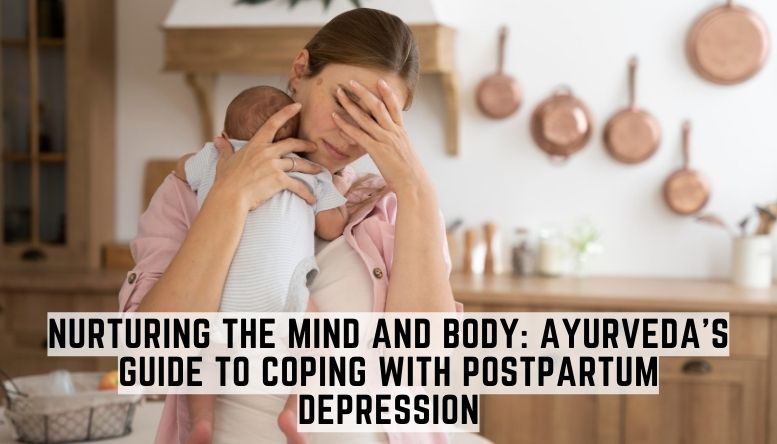


Motherhood is a big phase. While the period of postal natal care is filled with so much joy, it can also bring about unexpected challenges like postpartum depression. But you dont need to worry more. Because Ayurveda, the ancient holistic healing system, can help you with beating the postpartum blues.
The ‘Nurturing the Mind and Body: Ayurveda's Guide to Coping with Postpartum Depression” will talk about how Ayurveda can help with the complicated process of something like postpartum depression through the old Ayurvedic ways and dietary and lifestyle changes.
Whether you're a new mom or someone supporting her, these simple and effective tips will be your companions on the path to emotional well-being. So, let’s discuss how postpartum depression can be effectively managed by Ayurveda.
Most new moms tend to experience postpartum aka ‘baby blues’ after childbirth. It will cause a change in the behavior of the mother causing issues like mood swings, anxiety, and insomnia. Baby blues normally start during the first two to three days of birth and can linger for up to two weeks.
However, some new mothers suffer from postpartum depression, a more severe and long-lasting form of depression. It's also known as postpartum depression because it can begin during pregnancy and last days or months beyond childbirth. Postpartum psychosis is a rare serious mood illness that can occur after childbirth.
Some of the postpartum depression symptoms are quite hard to detect, but these are the common symptoms associated with the condition. They are :
Besides these conditions, women also suffer similar symptoms of depression which also include
Ayurveda offers a very detailed approach to promoting the overall well-being of an individual, including during the postpartum period. Here's how Ayurveda may help with postpartum depression.
Abhyanga
Abhyanga is an Ayurveda self-massage with oils like Bala thalia and pinda thalia, which aids in postpartum depression by promoting relaxation, improved circulation, a sense of nurture, and grounding,
It also helps with positive sensory experiences, mindfulness, better sleep, and self-connection. An experienced Ayurveda physician can effectively perform the massage to help new mothers. Our postnatal clinic provides expert assistance and personalized Ayurveda treatments for your needs.
Vethukuli
Vethukuli, or post herbal bath is a medical therapy practiced commonly in Kerala as part of post-delivery care. In this process, the new mom will take a bath with medicated hot water all over the body.
Takradhara
This procedure is known for its relaxing nature. The treatment involves pouring medicated curd over your head in a steady motion. It's quite effective to regain mental stability.
Nasyam
Nasya is one of the treatments suggested by Ayurvedic experts for postpartum depression. Vata dosha can become aggravated during the postal delivery period due to factors like irregular sleeping patterns, stress, and hormonal changes.
Vata imbalances are normally connected with issues like anxiety, mood fluctuation, restlessness, etc. And these are also linked to postpartum depression. The ayurvedic administration of warm oil on the patient might help alleviate some of these symptoms.
Diet & Nutrition
When it comes to eating, think about foods that make you feel cozy and warm inside. These types of foods can help bring balance to your emotions, especially during the postpartum period. Imagine enjoying a bowl of warm soup or a comforting bowl of oatmeal, these are the kinds of foods that can help soothe your mind. Connect with the professionals at our Ayurveda clinic Dubai to get a detailed understanding of the dietary needs during postpartum.
Certain foods have a special way of helping us feel better emotionally. They are known as comfort food. Think about bananas, which can lift your mood with their natural sweetness. Oats and whole grains are like a gentle hug for your tummy and your heart. Don't forget about nuts and seeds, like almonds and sunflower seeds, they're like tiny powerhouses of goodness that can help you feel more positive.
Also, studies have also shown that there is a link between nutritional deficiencies and postpartum depression. Some of the nutrient deficiencies that can also impact postpartum depression are omega-3 and omega-6 essential fatty acids, folate, and trace minerals, such as iron, Zinc, Selenium, and Potassium.
The brain also needs a continuous supply of nutrients like vitamins B3 and B6 to make sufficient neurotransmitters and serotonin.
Meditation and yoga are one of the best possible methods for handling postpartum depression. Meditation helps you be more aware of the present moment and less stressed, making it easier to deal with overwhelming thoughts and feelings. When it comes to yoga, especially the gentle kind, helps your body feel better, reduces stress, and improves your mood by combining movement, breathing, and relaxation.
Both practices can help you to get yourself together Together. Encourages you to connect your mind and body to heal. However, it is important to remember that they're best used with medical advice.
In conclusion, Ayurveda offers a gentle path toward healing postpartum depression. Balancing what you eat, practicing self-care, and using natural remedies, helps your body and mind find harmony. Just as a puzzle needs all its pieces, Ayurveda considers your whole self emotions, body, and energy. Remember, though, it's important to talk to experts, combining Ayurveda with modern care for a balanced approach, which is exactly why you should approach the professionals at Ayurheritage, the top Ayurvedic hospital Dubai. With Ayurveda's support, you're not alone on your journey to feeling stronger, calmer, and more like yourself again.